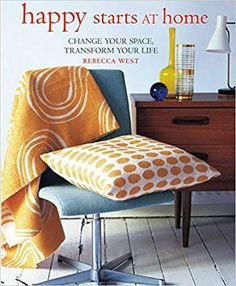Book Review: Happy Starts at Home
Abby talks a lot about the importance of keeping ourselves inspired, and as a new homemaker with a good amount of spare time to put toward this task, I have been spending the time to learn how to do so easily. I know I won’t have as much time or bandwidth to figure out how to do this at a certain point, so if I build in the habits now hopefully they will serve me well later. The two things I can easily do to keep myself inspired are listen to podcasts (for others this may be YouTube, great music, sermons, etc.), and always have a few home-focused books in my stack.
A recent find in this last category was the book Happy Starts at Home by Rebecca West. I wasn’t sure quite what it was, but I liked the pictures and decided to give it a try. (Turns out keeping yourself inspired is 75% about having something beautiful to look at.) The introduction sold me.
Throughout the whole book, she deals with the home as a tool that serves our lives and asks what sort of tool we have. Is it well-oiled, honed, and cared for? Is it rusty, neglected, so battered and bruised by how much it has gone through that it can’t even do the job we need it to do? Is it perfectly kept, fresh out of the box, unused, and unusable lest it be mussed?
This is a home decor book plus a lifestyle book. She doesn’t tell you any of the rules of decorating, decluttering, or organizing. She doesn’t tell you how to blend patterns, what size rug you need, or how high to hang a picture. Instead, she gives you homework. (None of which I did, but this book was helpful nonetheless.) She asks you questions, calls you out on negative mindsets, bad attitudes, laziness, and fatalism. She draws from her clients’ complaints and naysaying to predict what some of us design-challenged or home-pessimists may be thinking as we try to settle our homes the way we want them. She doesn’t tell you what to do. She tells you how to think it through and find your ‘why’ to get to your ‘how’.
My biggest complaint with this book was a few points of extremely secular or neo-spiritual thinking that crept in. (An example of this would be repeated advice for redoing your home after a breakup, or before having a “partner” move in.) But even in her most new-agey chapter on how your home should serve you spiritually, she had some good points on priorities and unconscious hypocrisy.
“Make sure that what you value is seen and reflected as you look around your home. Many Christian clients display beautiful crosses. Many of my Buddhist clients have altars. One symbol of your faith, however, can’t counter a house full of items that show a contradictory set of values. If you say that your deepest values center on nature but your home is overfilled with low-quality, rarely-used stuff, does that align with your values? If you say that your deepest values center on family and connection with others, but your whole home is focused on TV and screen time, does that align with your values? If your God is a god of loving kindness, simplicity, and generosity, do you see that in your home?”
I loved this. Read it. Then read it again. Then think about it and read it again. What do we claim is important to us? Going back to Melissa Meyer’s Love the Home You Have, what would be our family’s mission statement? Now are we living like it actually matters to us? If I say that hospitality is important to me, but I fill my house with priceless breakable things, couches that can’t be sat on, pillows that can’t be squished, rugs that can’t be walked in, does this tell you that hospitality is important to me? We’re in the business of making homes, my friends, not museums. And in homes, things break, get dirty, get loved, and we clean, fix, fluff, and do it all again. Or at least we should.
And that was my favorite thing about this book -- the constant call-outs and challenges to your settled thinking or excuse-making. For that alone, it’s worth reading. I wouldn’t necessarily pay cover price for it, but if it’s at your library, or available used for a few dollars and it sounds encouraging to you, scoop it up. I’ll leave you with one last passage I loved:
“Why do we let ourselves remain stuck in frustrating situations and unpleasant spaces for so long? The reason is simple: we cling to our habits because they do something for us, they serve a purpose. We keep conditions around us static because they are familiar, comfortable. To behave in a new way, the need for something new must outweigh the need for what we have now. Oftentimes, even though we say we want something new, it’s more than we think we should want something new. In reality we’d rather stick with what we know.
Clutter can be comforting if it keeps you from having to face the truth (like sorting through the stuff from your childhood or addressing all the disappointing purchases you’ve made). For some people, a messy house protects them because it means they don’t have to engage socially. (What better excuse to not have someone over than if the house isn’t “ready”?) A closed-off entry prevents from inviting anyone in. An unusable kitchen excuses an unhealthy lifestyle. An office-turned-storage room stops you from launching a freelance business. A TV-focused living room frees you from facing uncomfortable conversations within the family. A kid-overrun bedroom excuses the lack of intimacy in your marriage.
If you are ready for a more honest life, it will mean changing habits. It will mean changing what is around you. At first it may be deeply uncomfortable.”
P.S. How to Use Your Library
…or rather “Use Your Library”.
Back to what I was saying earlier about keeping ourselves inspired, one of the easiest ways to do that is through books. I know many people don’t enjoy heavy reading, and others are too busy at certain seasons, but most of us could find 15 minutes a day to flip through a beautiful home decor coffee table book even if it’s just over a morning cup of tea or a bath at the end of the day. Then the problem becomes who can afford those beautiful books? The library that’s who. And it turns out the library is very little work once you know how to use it.
The Dewey Decimal system doesn’t change from library to library, which means once you have a few numbers in your head, you can find awesome books in any library. This doesn’t mean you need to memorize the system…this just means when you know that the 640s are all home management focused, you can go straight there. More detailed knowledge will get you to the cookbooks in 641, or organizational books in 648. Need those beautiful home decor coffee table books? They’ll be tucked in throughout 747 (usually a massive section). Crafts, gardening, home medicine, every interest you could ever possibly have has a section.
Now, you’re going to have to do some digging to get through the most dated books that don’t have much to offer anymore, but even some of the dated books can be hidden gems. And remember too, specific titles can occasionally be put on hold and delivered from other libraries in your system, or even requested for the library to purchase them as catalog additions (I haven’t done this yet, but Abby has).
So go! Get stacks of free inspiration.
Here’s a link to a list of every major division in the DDS.
(Available for checkout from the Hearthkeeper Library.)



